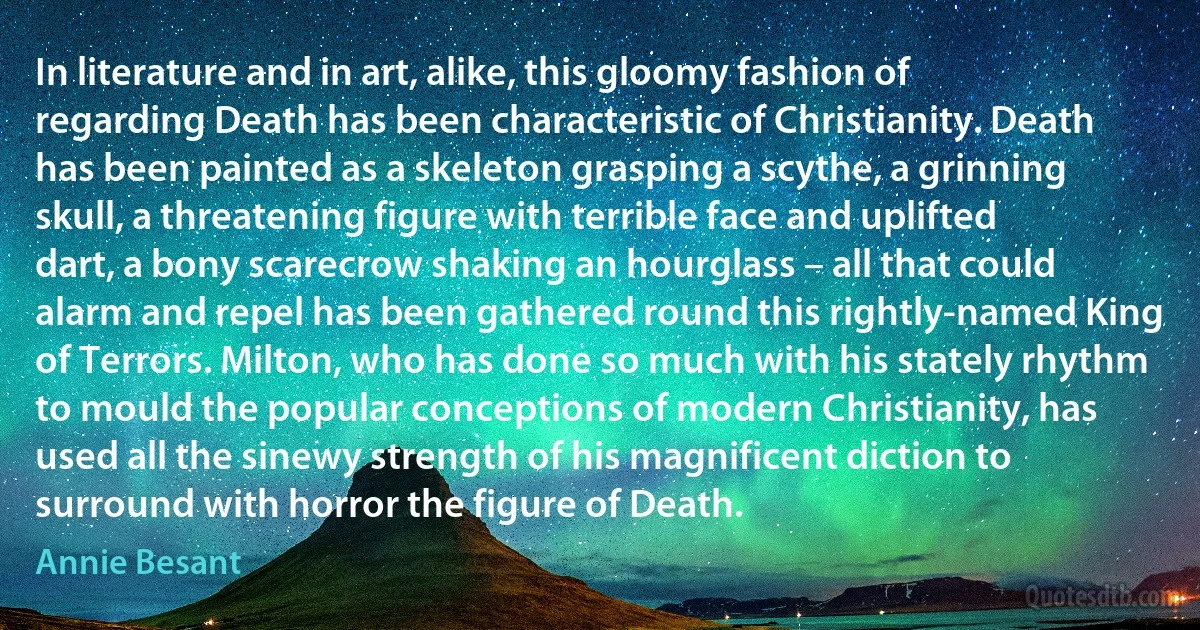
In literature and in art, alike, this gloomy fashion of regarding Death has been characteristic of Christianity. Death has been painted as a skeleton grasping a scythe, a grinning skull, a threatening figure with terrible face and uplifted dart, a bony scarecrow shaking an hourglass – all that could alarm and repel has been gathered round this rightly-named King of Terrors. Milton, who has done so much with his stately rhythm to mould the popular conceptions of modern Christianity, has used all the sinewy strength of his magnificent diction to surround with horror the figure of Death.
Annie BesantRelated topics
art characteristic dart death diction done face fashion gloomy grasping grinning horror hourglass king round scarecrow skull strength miltonRelated quotes
Some students of philosophy have unreasonably high expectations of the subject. They expect it to provide them with a complete and detailed picture of the human predicament. They think that philosophy will reveal to them the meaning of life, and explain to them every facet of our complex existences. Now, although studying philosophy can illuminate fundamental questions about our lives, it does not provide anything like a complete picture, if indeed there could be such a thing. Studying philosophy isn't an alternative to studying art, literature, history, psychology, anthropology, sociology, politics, and science.

Nigel Warburton
When we seek a textbook case for the proper operation of science, the correction of certain error offers far more promise than the establishment of probable truth. Confirmed hunches, of course, are more upbeat than discredited hypotheses. Since the worst traditions of "popular” writing falsely equate instruction with sweetness and light, our promotional literature abounds with insipid tales in the heroic mode, although tough stories of disappointment and loss give deeper insight into a methodology that the celebrated philosopher Karl Popper once labeled as "conjecture and refutation.”.

Stephen Jay Gould
Religion, a mediaeval form of unreason, when combined with modern weaponry becomes a real threat to our freedoms. 'This religious totalitarianism has caused a deadly mutation in the heart of Islam and we see the tragic consequences in Paris today. 'I stand with Charlie Hebdo, as we all must, to defend the art of satire, which has always been a force for liberty and against tyranny, dishonesty and stupidity. 'Respect for religion' has become a code phrase meaning ‘fear of religion.' Religions, like all other ideas, deserve criticism, satire, and, yes, our fearless disrespect.

Salman Rushdie
You, your families, your friends and your countries are to be exterminated by the common decision of a few brutal but powerful men. To please these men, all the private affections, all the public hopes, all that has been achieved in art, and knowledge and thought and all that might be achieved hereafter is to be wiped out forever.
Our ruined lifeless planet will continue for countless ages to circle aimlessly round the sun unredeemed by the joys and loves, the occasional wisdom and the power to create beauty which have given value to human life.

Bertrand Russell
I can imagine no man who will look with more horror on the End than a conscientious revolutionary who has, in a sense sincerely, been justifying cruelties and injustices inflicted on millions of his contemporaries by the benefits which he hopes to confer on future generations: generations who, as one terrible moment now reveals to him, were never going to exist. Then he will see the massacres, the faked trials, the deportations, to be all ineffaceably real, an essential part, his part, in the drama that has just ended: while the future Utopia had never been anything but a fantasy.

C. S. Lewis
